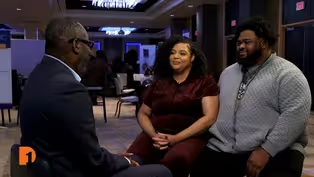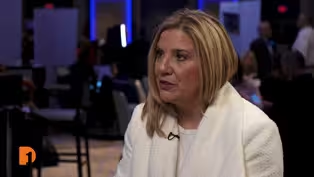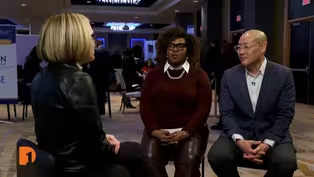
New report highlights Detroit-Ann Arbor Innovation Corridor
Clip: Season 9 Episode 31 | 4m 40sVideo has Closed Captions
Richard Florida talks about the possibilities for the Detroit region’s innovation economy.
At the 2025 Detroit Policy Conference, Creative Class Group Founder Richard Florida unveiled his organization’s latest report, “The Case for a Detroit-Ann Arbor Innovation Corridor.” The report highlights the potential for a groundbreaking regional innovation hub. One Detroit contributor Zoe Clark sits down with Florida to talk about the possibilities for the Detroit region’s innovation economy.
Problems playing video? | Closed Captioning Feedback
Problems playing video? | Closed Captioning Feedback
One Detroit is a local public television program presented by Detroit PBS

New report highlights Detroit-Ann Arbor Innovation Corridor
Clip: Season 9 Episode 31 | 4m 40sVideo has Closed Captions
At the 2025 Detroit Policy Conference, Creative Class Group Founder Richard Florida unveiled his organization’s latest report, “The Case for a Detroit-Ann Arbor Innovation Corridor.” The report highlights the potential for a groundbreaking regional innovation hub. One Detroit contributor Zoe Clark sits down with Florida to talk about the possibilities for the Detroit region’s innovation economy.
Problems playing video? | Closed Captioning Feedback
How to Watch One Detroit
One Detroit is available to stream on pbs.org and the free PBS App, available on iPhone, Apple TV, Android TV, Android smartphones, Amazon Fire TV, Amazon Fire Tablet, Roku, Samsung Smart TV, and Vizio.
Providing Support for PBS.org
Learn Moreabout PBS online sponsorshipTell me about this new report.
Ann Arbor, Detroit, Innovation Corridor.
- Well, I'm so lucky, Zoe, that the folks here at the Detroit Chamber at the University of Michigan in the mayor's office said we're in, you know, I had been pushing this for a while gently.
- Yes.
- Saying there's Ann Arbor with this spectacular research university, Detroit, which is kind of the symbol of a city that's rebuilt itself.
And they came and said, "Would you do this report?"
And I was like, "Yeah."
- You're like, "It's in my head already."
- There's nothing I'd rather do.
So what I did probably for the past six months is really try to enumerate the assets and sort of look at the playing field.
What I found is when you look at other innovation economies, the Bay Area, the Boston area, you know, the Research Triangle, Austin, or you look overseas, London, Stockholm, Berlin, Toronto, it stacks up really well but it's not organized.
You know, and I talk about this in the report.
20 billion in corporate research and development.
Like, fourth or fifth in the nation.
3 billion in university research and development.
Third in the nation.
Labeled this area as one of the best emerging or the best emerging startup ecosystem.
And because of affordability, you know, Bay Area's gotten expensive, New York's crazy expensive, even Austin and Miami.
Affordable quality of life, and then the idea is how do you pull it together and don't have, you know, the business community in Detroit, you know, in the center city and then a college town.
And here's the rub.
When I looked at this, something...
I should have known it, but it's not just having the... Everyone says, "Well, you need a great research university like Stanford."
"You need a great research university like MIT."
"You need a great research university like Michigan or Michigan State."
What I notice in every one of these places, it's a great college town and a great city.
Right?
It's not San Francisco, it's Palo Alto where Stanford was, and San Francisco.
- Yeah.
- It's not Boston, it was Cambridge Little town, college town, and Boston.
Research Triangle has two.
Durham and Chapel Hill with Raleigh.
Boulder and Denver.
And then I said to myself, "This is a no-brainer.
You have both components and more.
You gotta put it together."
- I'm curious about if in your mind having read the report, one of the things I did notice is a lack of sort of policy prescriptions, right?
So I wanna allow you a magic wand here, Richard Florida.
And if you were allowed to pass, whether it's one piece of legislation, get these stakeholders to do one thing right now to take what you've put together and really try to start building, you know, what needs to happen, what would that be?
- I would say there's three.
- Okay, you get three magic wands.
- And I didn't want to prescribe this in the report.
Because I'm an outsider.
I'm not part of this.
People like me, but I wanted the environment, the stakeholders to figure this out, and this be a spur.
But now you put me on the spot.
First thing is they need to get organized.
And I know the chamber wants to do this, the university, but they need to find a group.
I don't want us prescribe who's on that, which universities, all the universities.
But they need a group of business university and civic leaders to work this problem.
I called it a Detroit Ann Arbor Innovation Alliance.
Call it what you will.
I don't want to dictate it.
They need that.
Number two, and this came up in every conversation, you said it, It's hard sometimes to get between when you're visiting your friends.
- Yeah.
- We need better transit.
- Transportation.
- I mean, when that was said this morning, folks, the room broke into applause.
That was the only applause line that I, you know, someone on my panel said, "We need transit."
- Yeah.
- "We need transit."
Now, I have six nieces and nephews at the University of Michigan.
It's a schlep to get here.
They take the bus, they go in a car, they go in an Uber.
Transit.
Making this seamless the way it is in Boston, New York, the Bay Area.
The third one that came up, there's a lot of conversation about advanced mobility, obviously, with the auto industry, Michigan Central, the computer scientists, the AI people.
But we talked a lot with the business leadership here about a second thing.
Urban innovation.
You know, this is the place that has rebuilt itself.
Michigan Central is the... You know, it's the shining example for the world.
What if we thought about new building technology, new construction technology, new ways of building communities, new ways of using artificial intelligence?
This new ways of connecting people through new mobility, this could be the test bed for a whole new ways of placemaking in city building.
So those would be my three.
Black Tech Saturdays is building an inclusive tech ecosystem in Detroit
Video has Closed Captions
Clip: S9 Ep31 | 5m 48s | The co-founders of Black Tech Saturdays discuss building an inclusive tech ecosystem in Detroit. (5m 48s)
Ford invests in the future of mobility in the Motor City
Video has Closed Captions
Clip: S9 Ep31 | 5m 56s | Michigan Central COO Carolina Pluszczynski talks about investing in the future of mobility. (5m 56s)
The Song Foundation bridges gaps for Michigan entrepreneurs
Video has Closed Captions
Clip: S9 Ep31 | 6m 53s | The Song Foundation bridges gaps for entrepreneurs participating in the innovation economy. (6m 53s)
Providing Support for PBS.org
Learn Moreabout PBS online sponsorship
- News and Public Affairs

Top journalists deliver compelling original analysis of the hour's headlines.

- News and Public Affairs

FRONTLINE is investigative journalism that questions, explains and changes our world.












Support for PBS provided by:
One Detroit is a local public television program presented by Detroit PBS


